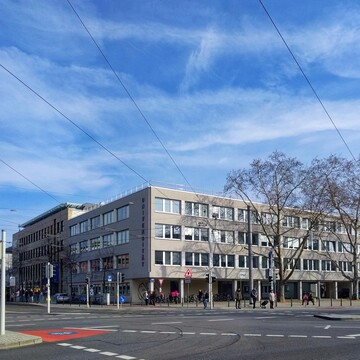Bachelor's Program in Economics
Program facts and information
Degree: Bachelor of Science (B.Sc.)
Standard period of study: 6 semesters (= 3 years)
ECTS credits: 180–188
(introductory phase: 103 ECTS credits, advanced phase: 77–85 ECTS credits)Language of instruction: German and English
Language requirements: A good level of English proficiency is recommended; no proof of language proficiency is required.
If you are not a German citizen or do not have a German university entrance qualification (Abitur or equivalent school leaving certificate), you must prove German language proficiency at C1 level.
Program start: Fall semester (September)
Academic calendarSchool: School of Law and Economics, Department of Economics
Semester fee: EUR 194 (more information)
Tuition fees for international students from non-EU countries: EUR 1,500
Tuition fees for a second degree: EUR 650Program overview
How can economic policy help to tackle the climate crisis? How will artificial intelligence affect the economy and our jobs? How does immigration affect the economy? Why is the independence of the European Central Bank important? The field of Economics addresses these and similar questions. The aim of economic analysis is to explain how economies work and develop.
During the program, students attend classes on, for example: basic economic principles, microeconomics, macroeconomics, economic policy, public finance, mathematics, econometrics, and academic writing and research.
Students can choose one or more minor(s). They can combine Economics with Mathematics, Law, Business Administration, Business Informatics, Philosophy, Political Science, Sociology, and Psychology.
Students can also attend seminars to develop key competences, such as intercultural competencies, conflict management, presentation techniques, and time management.
Why study Economics at the University of Mannheim?
Studying Economics in Mannheim means studying at one of the most renowned departments of economics in Europe. Independent national and international rankings, including the CHE university ranking, and rankings by the Handelsblatt and Junge Karriere, have confirmed the outstanding quality of the research and teaching at our university on a number of occasions. The Economics program in Mannheim was once again number one in the 2023 CHE university ranking. Take a look at the rankings here.
The bachelor's program in Economics at the University of Mannheim is characterized by thorough instruction in economic theories, early inclusion of empirical methods, and the combination of teaching and experience. The modules available during the advanced phase are extremely varied.
Students are given a variety of options to get involved in research at the Department thanks to its large number of chairs and professors, its close collaboration with external research institutions (such as the ZEW – Leibniz Centre for European Economic Research) and its acquisition of a large number of externally-funded projects.
By the way, 95% of our graduates would recommend the Economics program of study at the University of Mannheim to a friend or relative.
Career opportunities
Economists may be employed wherever an understanding of economics is required.
Depending on their specialization, they can work, for example, in ministries and international organizations, in politics, or in the banking and insurance sectors. Traditional employers also include the administrative departments at federal, state and community institutions, the European Central Bank, the Bundesbank, the Federal Statistical Office, and treasuries and associations. In addition, it is possible to go into business consulting or business journalism.
Economists can also pursue a career in academia either in Germany or abroad.
Required interests and skills
Students of Economics should
- be interested in economics and business administration,
- enjoy mathematics*,
- be capable of abstract thinking,
- be able to write and speak clearly,
- be able to argue logically,
- and understand complex texts (in German and English).
* The Department of Economics bases its mathematical requirements for first-year students on the catalog of minimum requirements for mathematics (Mindestanforderungskatalog Mathematik v3.0), for students of Economics and STEM subjects at higher education institutions in Baden-Württemberg. The refresher course in mathematics enables students to brush up on their math. You should be particularly interested in analyzing mathematical notation as this is required in many courses.
Program structure
Module catalog
The module catalog gives you an overview of the courses and their content.Studying abroad
The University of Mannheim is well-connected internationally, and is partners with around 450 universities around the world. The exchange coordinators at the Department of Economics can support you as you prepare to study abroad. The ideal time to study abroad is during the fifth or sixth semester of the program. A period of study abroad is optional for students of this program.Internships
We recommend that you complete one or two internship(s) in a relevant sector before you graduate. The university’s Career Network can help you to find an internship. An internship may be recognized for your degree program.Sample course schedule
Students normally attend these courses (PDF, 186 kB) during the first semester.Continuing Education
Certificate programs
Strengthen your potential, deepen your knowledge, find solutions for challenges we will face tomorrow – there are many good reasons to think outside the box, get to know and try out new things even during your studies.At the University of Mannheim, you can do this in the “Studium Oecologicum” which focuses on sustainability. In our certificate program, you will acquire interdisciplinary expert knowledge which can help you to act ethically and to make holistic decisions.
Language courses
Making language learning easier: No matter if you want to learn Japanese, Hebrew, Spanish or Norwegian, take the Graduate Record Examination Test (GRE), The European Language Certificates (telc) or the TOEFL test – each semester, the University of Mannheim offers language courses and language certificates in more than 16 languages for students and non-university members, online and on campus!Studium Generale
Are you interested in IT or communication trainings or theater, music, or drawing courses? Studium Generale has a vast range of courses available to all.Further study
If you have obtained the required number of ECTS credits in Business Administration, you can pursue the Mannheim Master in Management (M.Sc.).
Application and selection
At the University of Mannheim, a traditional numerus clausus (within the meaning of a minimum grade required for admission) does not exist. In our selection process, we take numerous criteria into account. For more details, please check the selection statutes (see below). Be bold! Please do not hesitate to contact us if you need advice. We are looking forward to receiving your application!
In our selection process for the Bachelor's Program in Economics, we take the following criteria into account:
- the grade average achieved in your university entrance qualification,
- work experience, internships, and voluntary positions, which are relevant to the Economics program of study.
German language proficiency
If you are not a German citizen or do not have a German university entrance qualification (Abitur or equivalent school leaving certificate), you must prove German language proficiency at C1 level.Selection statutes
Under “Application and selection” we have compiled the most important selection criteria of the program for you. For more detailed explanations of the selection process and the legally binding requirements of the degree program, please refer to the selection statutes.If the program of study is currently not selective, you will receive a study place if you fulfill all admission requirements and apply in due time and form.
Scholarships and funding
The university offers various funding opportunities. Around 200 Mannheim students receive scholarships every year, which are intended to give them the freedom to focus on their academic achievements or to continue their voluntary work alongside their studies. Find out more about the funding opportunities and feel free to apply, for example, for the Deutschland Scholarship, the Opportunity Mannheim Scholarship or the Elite Sports Scholarship Rhine-Neckar Metropolitan Region.Funding opportunities for international degree-seeking students
Application
- The application deadline for our bachelor's programs for the fall semesters starts on 1 June and ends on 15 July.
Insights into studying
In the VWL-Lounge series, Mannheim Economics students and their professors meet. They talk about studying and living in Mannheim as well as current research topics. In this episode, Emil speaks with Professor Lei Li. Emil is a second-semester student in the bachelor's program in Economics, and Lei Li is Assistant Professor of International Trade. Their discussion covers topics such as the benefits of spending an exchange semester abroad at Mannheim’s partner universities in Beijing, the effects of trade tariffs, and cross-cultural experiences.
Contact
Dr. Thorsten Lindenbauer (he/him)
Department of Economics
L 7, 3–5 – Room 409
68161 Mannheim
Aktuell kann leider keine Sprechstunde angeboten werden. Bitte kontaktieren Sie mich bevorzugt per E–Mail.

Dipl. Vw. Linda Köhler (she/her)
Department of Economics
L 7, 3–5 – Room 407
68161 Mannheim
Open consultation: Tuesday, 9:00 – 12:00 a.m. or by prior arrangement by e–mail. Please contact me by e–mail outside of the consultation hours.
Office hours on 24 June and 1 July are canceled.

Admissions Office
L 1, 1 – Room 157, 158
68161 Mannheim



